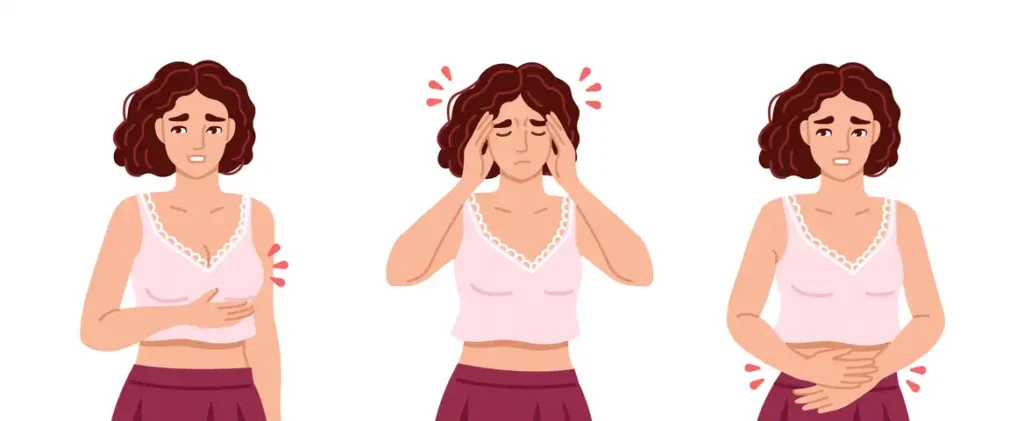For many women, perimenopause brings expected changes like hot flashes or mood swings—but then there are the curveballs. One of the more surprising and unsettling symptoms? Dizziness during perimenopause.
If you’ve ever felt like the room is spinning, experienced sudden lightheadedness, or struggled with balance during this transitional phase, you’re not alone. This often-overlooked symptom of dizziness perimenopause can be disruptive, even scary. But the good news is: it’s usually manageable, and it’s not just in your head.
What Is Perimenopause?
Before diving into the dizziness, it’s important to understand what perimenopause is.
Perimenopause refers to the years leading up to menopause—the point when a woman has gone 12 months without a menstrual period. During this time, typically starting in a woman’s 40s (but sometimes earlier), estrogen and progesterone levels fluctuate dramatically.
These hormonal changes trigger a wide range of physical and emotional symptoms, including:
- Irregular periods
- Hot flashes
- Sleep disturbances
- Anxiety or irritability
- Brain fog
- And yes—dizziness
To understand why dizziness happens, we need to look at the role hormones play beyond reproduction.

What Causes Dizziness Perimenopause Symptoms?
There isn’t a single cause of dizziness in perimenopause—it’s often the result of several overlapping factors, many tied directly to hormonal changes.
1. Hormonal Fluctuations
Estrogen influences many systems in the body, including your inner ear (which regulates balance), your nervous system, and your vascular system (blood pressure regulation). As estrogen levels rise and fall, these systems can become temporarily unbalanced, leading to symptoms like:
- Vertigo (a spinning sensation)
- Lightheadedness
- Feeling off-balance
2. Changes in Blood Pressure
Hormonal shifts can lead to blood pressure instability, especially dips when standing up quickly (orthostatic hypotension). This can trigger sudden lightheadedness or “head rushes.”
3. Migraines and Vestibular Migraines
Even women who haven’t had migraines before may begin experiencing vestibular migraines during perimenopause. These migraines don’t always come with headaches but can cause dizziness, nausea, and visual disturbances.
4. Anxiety and Panic Attacks
Perimenopause is closely tied to increased anxiety for many women, which itself can bring on episodes of dizziness, shortness of breath, and a racing heart.
5. Sleep Disruption
Poor sleep is a hallmark of perimenopause—and it can leave your brain feeling foggy and unsteady. Chronic sleep deprivation can also trigger changes in blood pressure and equilibrium.
6. Nutrient Deficiencies
Lower levels of iron, vitamin B12, or magnesium—common during this stage—can contribute to dizziness and fatigue.

What Does Dizziness Perimenopause Feel Like?
Women describe dizziness in perimenopause in a variety of ways, including:
- “The floor felt like it dropped out from under me.”
- “I stood up and everything went fuzzy.”
- “I was walking and suddenly felt like I might fall over.”
- “Everything was spinning, but I wasn’t moving.”
These sensations can last anywhere from a few seconds to several hours. Some experience them once a week; others, every day.
How Do You Know It’s Hormone-Related?
The best clue? Timing.
If your dizziness appears alongside other perimenopausal symptoms—irregular periods, hot flashes, brain fog, anxiety—there’s a strong chance hormones are playing a role.
You can also explore this science-backed guide to understanding perimenopause symptoms to see how symptoms are interrelated.
Still, it’s important to rule out other medical causes, such as:
- Inner ear disorders (like Meniere’s disease or BPPV)
- Anemia
- Low blood sugar
- Dehydration
- Cardiovascular issues
- Medication side effects
If your dizziness is severe or persistent, talk to your healthcare provider for a full evaluation.
Managing Dizziness During Perimenopause
Here’s the good news: there are many ways to manage and reduce dizziness related to hormonal changes.
Lifestyle Adjustments
- Hydration: Aim for 8+ glasses of water daily to maintain blood pressure and fluid balance.
- Stable Blood Sugar: Eat small, frequent meals with protein and healthy fats to avoid spikes and dips.
- Gentle Movement: Yoga, tai chi, or light stretching can improve balance and calm the nervous system.
- Sleep Hygiene: Try to go to bed and wake up at the same time each day. Limit screens at night.
- Avoid Sudden Movements: Stand up slowly, especially after sitting or lying down.
Supplements and Nutrition
- Magnesium: Helps with nerve function and may reduce dizziness.
- Iron/B12: Ask your doctor to test your levels—deficiencies can worsen symptoms.
- Omega-3s: These healthy fats support brain and nerve health.
Note: Always consult your doctor before starting new supplements, especially during perimenopause when other medications may be involved.
Hormonal Support
For some women, HRT (hormone replacement therapy) or bioidentical hormones can help balance out extreme fluctuations and ease symptoms like dizziness. This approach isn’t for everyone, but it’s worth discussing with your healthcare provider.
When to Seek Medical Attention
Dizziness that’s mild or occasional may just be part of your perimenopausal journey. However, if you experience:
- Sudden, severe vertigo
- Difficulty walking or speaking
- Fainting or blacking out
- Chest pain
- Confusion or disorientation
Seek immediate medical care. These could be signs of a more serious underlying condition.

Frequently Asked Questions: Dizziness and Perimenopause
- Is dizziness a common symptom of perimenopause?
Yes, dizziness is more common than most people realize. While it’s not as widely recognized as hot flashes or irregular periods, many women report feelings of lightheadedness, vertigo, or imbalance during perimenopause. Hormonal fluctuations—particularly in estrogen—can disrupt balance, blood pressure, and brain chemistry, all of which may contribute to dizziness. - What kind of dizziness should I worry about?
While mild, occasional dizziness can be a normal part of perimenopause, some symptoms should not be ignored. You should seek medical attention if your dizziness is:
- Accompanied by chest pain or shortness of breath
- Paired with slurred speech or numbness
- Causing fainting or blackouts
- Sudden and intense, especially if you’ve never experienced it before
- Can anxiety make dizziness worse during perimenopause?
Absolutely. Anxiety and panic attacks are common during perimenopause due to hormonal imbalances, and both can contribute to sensations of dizziness or feeling off-balance. The body’s “fight-or-flight” response triggers changes in blood flow and breathing, which can lead to lightheadedness. It’s a good idea to track whether your dizzy spells coincide with stress or anxious moments. - How long does dizziness last in perimenopause?
It varies from woman to woman. Some may experience dizzy spells for a few months, while others might deal with it intermittently for years. The frequency and intensity often correlate with other hormonal symptoms. The good news is, for many women, dizziness tends to fade as hormone levels stabilize post-menopause. - Can lifestyle changes really make a difference?
Yes, and often more than you’d expect. Staying hydrated, eating balanced meals, improving sleep, and managing stress can significantly reduce the severity and frequency of dizziness. In many cases, these basic changes help regulate blood pressure and stabilize blood sugar—both of which can improve how your body feels during hormonal shifts.
Final Word
Navigating dizziness during perimenopause isn’t easy, but it is manageable—and you’re definitely not alone. With knowledge, support, and a few lifestyle adjustments, you can regain your balance (literally and figuratively).
For a broader overview of how hormones impact your body during this phase, check out this detailed internal guide:
👉 Understanding Perimenopause Symptoms: A Science-Backed Guide to What’s Happening in Your Body







